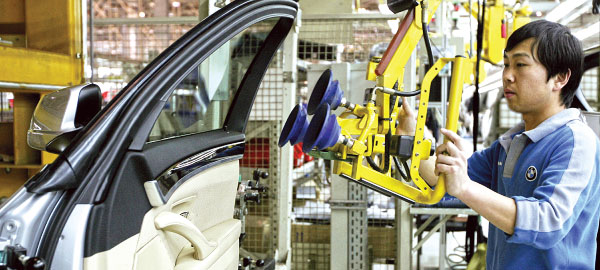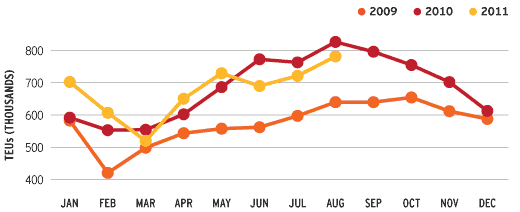Global Logistics—October 2011

BMW Rides Orient Express to China
As yet another sign that the Eurasian land bridge is becoming a preferred means for moving intercontinental shipments, DB Schenker Rail Automotive recently began overseeing auto part transports from Leipzig to Shenyang in northeastern China on behalf of BMW.
Trains loaded with parts and components depart from DB Schenker’s Leipzig-Wahren transshipment terminal for a three-week, 7,000-mile journey to BMW’s Shenyang plant in the Liaoning province, where components are used in the assembly of BMW vehicles. Beginning in late November 2011, trains will depart Leipzig once each day.
"With a transit time of 23 days, the direct trains are twice as fast as maritime transport, followed by over-the-road transport to the Chinese hinterland," says Dr. Karl-Friedrich Rausch, member of the management board for DB Mobility Logistics’ Transportation and Logistics division.
The route reaches China via Poland, Belarus, and Russia. DB Schenker Rail cooperates with partner rail companies in each country to oversee the trains.
The move is not without challenges, however. Containers have to be transferred by crane to different gauges twice—first to Russian broad gauge at the Poland-Belarus border, then back to standard gauge at the Russia-China border in Manzhouli.
Shipping Industry Exhorts UN to Fight Piracy
The global shipping industry (represented by the Round Table of international shipping associations) has called on the United Nations (UN) to establish a force of armed military guards to tackle the piracy crisis in the Indian Ocean.
In a letter to UN Secretary-General Ban Ki-Moon, the International Chamber of Shipping (ICS), BIMCO, INTERTANKO, and INTERCARGO demanded the UN take action to curb rising levels of piracy. "It is now abundantly clear to shipping companies that the current situation, whereby control of the Indian Ocean has been ceded to pirates, requires a bold new strategy," the associations state. "To be candid, the current approach is not working."
Regretting the increasing need for shipping companies to employ private armed guards to protect crews and ships, the letter continues: "It seems inevitable that lawlessness ashore in Somalia will continue to breed lawlessness at sea."
The shipping industry organizations fully support the UN’s long-term measures on shore aimed at helping the Somali people, but are concerned that these "may take years, if not decades, to have a meaningful impact on piracy."
Asian Logistics Set to Soar
The Asia Pacific transport and logistics market’s vitality and complexity offer investors and operators the industry’s best prospects for growth and returns, according to Transport Intelligence’s Asia Pacific Transport & Logistics 2011 report.
While logistics companies in Europe and North America struggle with a long-term weak economic environment, Asia offers many more opportunities. The England-based market research company identifies three key drivers to growth:
- The Chinese economy’s rapid development shows no sign of slowing, and its progression from a low-cost manufacturing base to high-value production location marks a new stage in its evolution. As labor costs rise in China, production is spilling over into neighboring, lower-cost markets. Both trends offer opportunities to freight forwarders and contract logistics providers.
- The leading Asian economies’ integration is proceeding fast, with free trade agreements reducing barriers to international commerce. Logistics companies can increasingly view parts of the region as a single market.
- Governments throughout the region are investing in numerous transport infrastructure projects as intra-regional trade increases, facilitating the provision of logistics services. Emerging countries such as Laos, Cambodia, and Sri Lanka have seen major boosts in their economies as the number of manufacturing operations increase and disposable income rises. Consequently, these countries are rapidly ramping up projects to build airports, roads, and rail networks in order to compete in the global economy.
Canadian Trucking on a Roll
Canadian trucking companies have completed the most takeovers in more than one decade. The country’s 10 trucking acquisitions in 2011 are up from four in 2010, and one short of 2006’s record of 11, according to data recently compiled by Bloomberg. There were no takeovers in 2009, when the world’s 10th-largest economy was hit hard by the global recession.
For Canadian companies such as Contrans Group, Mullen Group, and TransForce, buying smaller haulers is attractive because the country is likely to avoid the brunt of any global slowdown. Canadian truck stocks may see gains even with the threat of more weakness in the country’s trading partners. All of this bodes well for economic recovery.
U.S. Vessel Imports from China
Vessel imports from China reached a high for 2011 in August; however, they still lag behind last August’s figures (down 5 percent). With mixed economic reports, many importers are cautious as the holiday shopping season approaches.
Source: Zepol Corporation
Geodis Greens the Distripolis
French logistics company Geodis is changing the urban delivery landscape in Lille, France, by deploying hybrid refrigerated trailer trucks. The new initiative is part of Geodis’ Distripolis urban logistics system that will transport product to six Carrefour stores in the city center more sustainably.
In 2010, Geodis teamed up with Renault Trucks to test a unique hybrid vehicle equipped with a cryogenic refrigeration unit. The vehicle was proposed to several customers for testing, and retailer Carrefour was the first to request the new units, which fit its sustainable development strategy. The 29-ton hybrid trucks, which comply with the Euro 5 emissions standard, began delivering goods to Carrefour stores in October 2011.
The thermal engine-electric motor combo in hybrid trucks lowers diesel consumption by an average of 20 percent, an annual CO2 emissions reduction of 11 tons. Using liquid nitrogen, a non-toxic substance that doesn’t emit CO2, as the refrigeration fluid makes the vehicles even more environmentally friendly.
The vehicles also have separate transport compartments, so both fresh produce and dry goods can be delivered at the same time. In addition, the cooling unit lowers the temperature twice as fast, making the trucks particularly useful for transporting vegetables.

